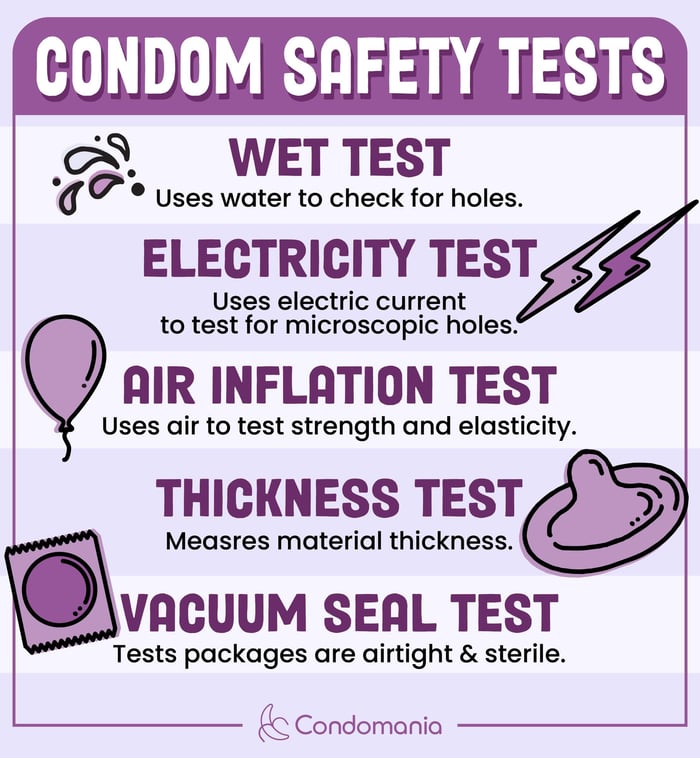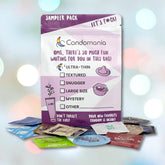How do you know you’re really safe from unwanted pregnancy and STI transmission when you’re wearing a condom?
Condom companies test their condoms for strength and reliability to protect your most sensitive bits (and prevent surprise babies).
But can you trust the tests?
Generally, yes. But it depends on the condom. Not every single condom is tested, and some brands perform more rigorous testing than others.
The government requires a certain level of testing, but some brands go above and beyond these bare minimums to provide a higher standard of safety.
Read on to learn about how condom testing works and the quality of protection that you can expect from your condom.
You’ll also find out which brands do the most comprehensive testing so you can get a condom that meets your needs for confidence and security in the bedroom.
Your condom goes through enough testing to earn a diploma before it ever makes it into your nightstand. To ensure it’s up to the task, manufacturers put condoms through a series of safety checks designed to catch any weak spots.
Not all condom manufacturers perform the same tests.
The only tests required by the FDA are leak testing, tensile strength testing, and package integrity testing (I’ll explain those in a minute). That means every company that sells condoms in the US must perform these tests.
The FDA does not require every individual condom to be tested—only a few condoms per manufactured batch. This is called batch testing.
If a few condoms pass the tests, all of the condoms in that batch pass. If one of the selected condoms fails, the entire batch must be discarded.
Some condom companies perform extra testing, like electronic testing, air burst testing, and dimensional testing.
They may also test every condom instead of only a few per batch. This provides a higher standard of inspection and safety.
Let’s cover the required tests and the most common extra tests in more detail:

Water Leak Testing
Tensile (Stretch) Testing
Package Integrity Testing
Electronic Testing
Air Burst Testing
Dimensional Testing
 Water Leak Testing
Water Leak Testing
Water leak testing is one of the most widely used methods to check for holes in condoms. It is one of the batch tests that complies with FDA leak testing, so it’s legit.
Manufacturers fill the condom with about 300 ml of water and let it hang for a set period, checking for any signs of leakage.
This test simulates real-world conditions by confirming that the condom can hold fluid without fail. That’s a pretty important part of preventing STI transmission and pregnancy.
This test is effective at identifying even small holes that could compromise safety.
However, water leak testing can only be done on sample batches because it destroys the condom. That means the condom you buy wasn’t tested this way, but others from the same manufacturing batch were.
 Tensile (Stretch) Testing
Tensile (Stretch) Testing
Tensile testing measures how far a condom can stretch before breaking. The material is pulled in opposite directions to assess its strength and overall durability.
Think of it like stretching a rubber band until it snaps.
This test ensures that condoms won’t tear during use, even under pressure. It also verifies that the material meets FDA standards for elongation and tensile strength.
Condoms must be able to stretch several times their original length without tearing.
Some brands perform more extreme tensile testing to make sure their condoms are tough enough to withstand real-life movement, friction, and stress.
Like water leak testing, tensile tests are for batch testing only (for obvious reasons). So, the condoms you buy were not individually tensile tested.
 Package Integrity Testing
Package Integrity Testing
Package integrity testing doesn’t test the condom itself but the condom wrapper. It confirms the wrappers are fully sealed and protective.
Condoms often undergo a few different package tests to simulate various environmental stressors like pressure, aging, and moisture exposure. Some of the most common include:
Vacuum leak testing: This test involves putting condoms in a vacuum chamber to detect tiny leaks in sealed packages by observing pressure changes or bubble formation.
Dye penetration testing: Condom packages are submerged in a colored liquid to see if any dye seeps through the seals, revealing microscopic holes.
Burst pressure analysis: This test measures how much internal pressure a condom package can withstand before bursting.
A strong, intact package preserves the condom’s strength and sterility. If a condom seal is weak or damaged, the entire batch is tossed.
This type of testing is for batch testing only, and it is required by the FDA.
 Electronic Testing
Electronic Testing
Electronic pinhole testing is one of the most precise safety checks used in condom manufacturing. It is not required by the FDA, but it is probably the gold standard of condom testing today.
Why? Because every single individual condom can be electronically tested, making it much more comprehensive than batch testing.
In electronic pinhole testing, the condom is rolled onto a metal rod that conducts electricity. Because latex is an electrical insulator, the electric current should not flow through the condom if it’s intact. However, if there’s even a tiny hole or defect, the electrical current will pass through the opening and reach the metal rod, instantly identifying the condom as defective.
Electric testing ensures near-total confidence that the condom has no microscopic holes that could allow fluids to pass through, offering top-tier protection against STIs and pregnancy.
 Air Burst Testing
Air Burst Testing
Air burst testing involves inflating condoms with air until they burst. It ensures condoms can withstand high pressure well beyond what they would encounter during sex.
It is a type of tensile test, though unlike basic stretch tests, this test provides a more comprehensive evaluation of strength and elasticity. Instead of simply stretching the condom, it is inflated. This can more accurately detect weak points.
If a condom pops too soon or at a lower pressure than expected, it fails the test, and the entire batch is thrown out.
Even though it’s a batch test, this method is a higher standard of tensile test, ensuring only the most resilient condoms make it to market.
 Dimensional Testing
Dimensional Testing
Dimensional testing confirms that condoms meet strict requirements for size and shape.
Manufacturers measure the condom’s length, width, and barrier thickness to confirm consistency and compliance with the law. If condoms don’t conform to the advertised dimensions, they could put users at risk.
Wearing a condom that fits properly is a big part of condom safety. A condom that’s too thin may tear, while one that’s too small or too tight may cause slippage or breakage.
Dimensional accuracy affects comfort, safety, and effectiveness, especially during “rigorous” movement (if you know what we mean).
It’s also important for branding. For example, companies want to be sure that their “ultra-thin” condoms are as thin as advertised.
Dimensional testing may not be as fun or flashy as burst or electronic tests. Essentially, it’s just a basic measurement of condom size. However, it’s important for safety, and it shows that brands care about consistent and accurate sizing.
Condom testing costs money, and it increases risk for condom brands. If they find a defective condom in extra tests, they’ll have to throw out an entire manufacturing batch—up to 100,000 condoms!
So, you can expect to pay more money for condom brands that do additional testing. Cheaper brands are more likely to do the bare minimum to make it on the shelf.
If security is important to you, you may want to pay an extra buck or two for a premium condom brand. Even if it just gives you more confidence in bed, that goes a long way towards your (and your partner’s) pleasure.
So, which brands are known to go the extra mile on condom testing? Here are some of the brands that test the most.
LELO HEX
LELO HEX is marketed as a luxury condom brand, offering a hexagonal lattice structure designed to improve strength and grip without increasing thickness.
Translation: These condoms are ultra-thin and ultra-strong.
According to LELO, its manufacturing includes enhanced structural testing to verify durability. While it follows all required testing protocols, LELO goes beyond FDA minimums, particularly in stress and tensile resistance due to its unconventional design.
At the moment, LELO HEX makes just two condoms: LELO HEX Original and LELO HEX XL.
Kimono
Kimono Condoms are America’s first ultra-thin condom. They were the first to master a crazy thin barrier while maintaining high tensile strength.
Kimono emphasizes that each condom is individually tested using electronic pinhole detection, rather than sample-based testing, which is the legal minimum.
We love Kimono because it's among the most affordable premium condom brands. So, you can get the security of additional testing without paying much more cash.
Durex
Durex is the best-selling condom brand in the world. One of the reasons for that is the brand’s insistence on extra testing. Durex has proven again and again that its condoms are incredibly strong, inspiring videos like this one showing how its condoms simply refuse to break.
The company claims that every condom undergoes electronic testing and that additional tests are done beyond standard FDA requirements. These include burst pressure tests, tensile strength testing, and lubrication consistency checks.
Durex operates its own manufacturing facilities and has control over quality from end to end. So, you can trust that every condom has been produced under strict oversight.
Trojan
Trojan dominates the US condom market and is known as America’s most trusted condom brand. That’s not all marketing BS, either.
Trojan electronically tests each condom individually. It also performs batch tests such as water leak testing, air burst testing, and physical inspections.
Trojan's long-standing reputation for reliability is built on consistent manufacturing and aggressive batch rejection if any issue is found during testing.
More Condom Brands that Do Extra Testing
The condom brands above are among the most recognized for their above-and-beyond testing. But they’re not the only condom brands that exceed minimum standards. Here are a few more brands that perform electronic testing and other safety tests.
Generally, you can trust every condom you find on the shelf in the US. Condoms sold in the USA must be approved by the FDA.
This means they have undergone tests for strength and reliability that determine them to be 98% effective at preventing pregnancy and STI transmission.
However, that extra 2% of risk isn’t something to mess around with. Condom brands that do extra testing, especially electronic testing, may close the risk gap further and help you enjoy safer, more confident sex.
And it only costs about 10-20 cents more per condom for that extra peace of mind.
Use condoms like Durex, Trojan, Kimono, ONE Condoms, and LifeStyles if safety matters to you. These brands perform electronic tests on every condom to check for damage.
Where to Shop for Safe Condoms
Be careful where you shop for condoms. Gimmicky online shops sell knock-offs and expired condoms. They are not safe.
Shop at Condomania to get properly tested and stored condoms made by FDA-approved brands. We only carry condoms that meet legal standards and above.
Condomania has been America’s favorite condom shop for over 30 years, and we know condom safety better than just about anyone. The CDC even invited us to teach them about condoms!
Shop for safe condoms at Condomania now, and upgrade your security—and sensation—in the bedroom.
Want to learn more about condom safety? Most condoms malfunction due to human error—not manufacturer error! Learn how to put a condom on the right way to make your sexual security iron-clad.













